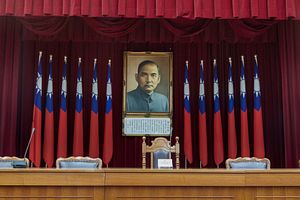It was question time on the first day of Taiwan’s newly elected congress last Friday, and debutant legislator Huang Kuo-chang of the New Power Party was already turning up the heat.
Established in the wake of the Sunflower Movement, and rooted in Taiwan’s vibrant civil society scene, the New Power Party won five seats in Taiwan’s Legislative Yuan in the January elections. The NPP legislators will need to live up to the expectations of voters that they perform the role of watchdog from inside parliament as much as they did from outside on the barricades.
The NPP’s Huang clearly sank his teeth into the new job last Friday, losing no time to question ministers on issues that have long been a concern for civil society groups — starting with nuclear energy.
“218 pages of content [in the 2016 policy address] and not a word on nuclear waste disposal?” Huang critically asked the minister of economic affairs.
The anti-nuclear campaign in Taiwan arose together with civil society in the late 1980s — when martial law was lifted — and was reinvigorated after the nuclear disaster in Fukushima, Japan, in 2011. Three power plants from the 1970s are still in operation. But the construction of a fourth nuclear power plant was halted in 2014 after a few years of insistent civic activism.
The newly elected DPP-majority government under president-elect Tsai Ing-wen has promised to phase out nuclear power and replace it with renewable energy by 2025. The first DPP president, Chen Shui-bian, previously attempted it but was stopped in the legislature by a Nationalist majority.
But it was the NPP’s chairman who asked the tough questions on issues that have long been on banners of anti-nuclear activist groups. For example, how the government planned to handle nuclear waste as the spent fuels at four reactors of two plants in northern Taiwan are close to saturation, a topic that the 218-page policy report did not address.
Huang also addressed the nuclear waste storage facility on Orchid Island (Lanyu), a cause that brought environmental and indigenous rights activists together as the island is home of the Tao aborigines.
The government had promised that nuclear waste would be removed from the island within the next year. “It is difficult,” admitted John Chen-Chung Deng, Taiwan’s economic affairs minister. Huang replied: “If the government cannot even make good on the promise about low-level nuclear waste, how could the public believe the claim that by 2055 a place for the final disposal of nuclear waste would be found?”
The minister of labor, Hsiung-Wen Chen, was also on the receiving end of Huang’s questioning firing line. And again, Huang addressed a topic that has been the subject of protests in past years, such as the issue of companies forcing employees to take unpaid leave to cut costs.
Huang’s question time was a popular thread on Taiwan’s bulletin board system PTT, with many users applauding the tough questions he asked. “This is what you call a legislator,” writes user kay0629. Another user wrote: “We need to have more of such legislators!”
It still remains to be seen how the NPP’s legislators perform as the new “third force” voice in parliament. But Huang’s questioning on issues of nuclear waste and labor laws on Friday is perhaps only the beginning of the NPP’s active role as watchdog in parliament.
(The full video of Huang Kuo-chang’s interpellation can be found here.)

































